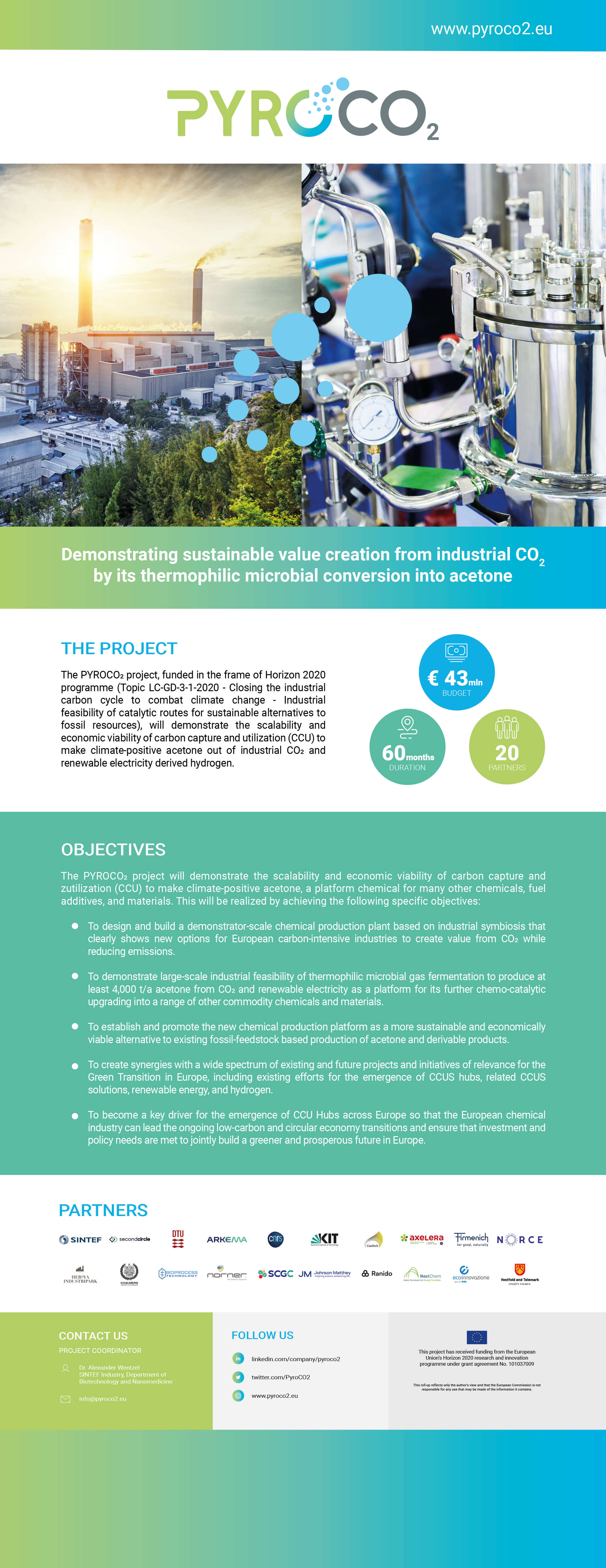Demonstrating sustainable value creation from industrial CO2 by its thermophilic microbial conversion into acetone – PyroCO2
Jawad Elomari, SINTEF, Norway
Abstract
Background:
Achieving climate neutrality requires a rapid paradigm shift towards the implementations of new climate positive solutions that can boost the European market. Emerging solutions for Carbon Capture, Utilization, and Storage (CCUS) have great potential to decarbonize production in the chemical industry, while allowing value creation from parts of its own carbon emissions. In this context, the PYROCO2 project will demonstrate the scalability and economic viability of CCU to make climate-positive acetone out of industrial CO2 and renewable electricity derived hydrogen.
Summary of the project:
The core technology is an energy-efficient thermophilic microbial bioprocess that is expected to reduce about 17 Mt CO2eq by 2050. The acetone produced here will be demonstrated as an ideal platform for the catalytic synthesis of a range of chemicals, synthetic fuels, and recyclable polymer materials from CO2, generating a portfolio of viable business cases and pre-developed processes for replication and commercialization. The demonstrator plant will be able to produce about 4,000 tonnes acetone annually from 9,100 tonnes of industrial CO2 and green hydrogen.
PYROCO2 is largely industry-driven, with 20 partners from 10 European countries and Thailand. It involves seven large enterprises (ARKEMA, FIR, SCG, JM, NEXTCHEM, CTECH), five SMEs (SC, BPT, RANIDO, HIP, ECOIN), four academic partners (CTH, DTU, Univ. Lyon1/IRCELYON/CNRS, KIT), three RTOs (SINTEF, NORCE, NORNER), one Public-Private Cluster (AXELERA), and a regional authority partner (VTC).
Progress and outlook:
Intensive efforts by SecondCircle, DTU, SINTEF, and NORCE improved the robustness of the microbial biocatalysts used in each fermentation step and their cultivations. By mimicking nature, through evolution and combination with novel strain engineering approaches, the bacteria used to convert substrates into products grows more rapidly and favourably. The fermentation process is now ready for further scale up in the next months.
Ranido assembled and commissioned a pilot reactor for the chemo-catalytic upgrading of acetone, and now the reactor is fully operational at Ranido’s site in Czech Republic. Whereas, CNRS has focused on the characterization of the catalysts by employing gas adsorption microcalorimetry to investigate the acidic and basic properties of the catalysts. Now, the catalysts are identified and classified based on the number and strength distribution of the active sites. Finally, the stability of the solids towards steam has been studied by treating the solids in boiling water (100°C) and in steam (400°C). It was observed that the surface reconstruction in the presence of steam can induce catalyst deactivation.

